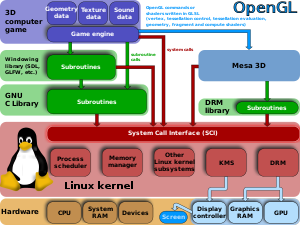This article has multiple issues. Please help improve it or discuss these issues on the talk page. (Learn how and when to remove these template messages)
|
VOGL is a debugger for the OpenGL rendering API intended to be used in the development of video games. VOGL was originally written at RAD Game Tools and Valve. VOGL is free and open-source software subject to the terms of the MIT License.
| Original author(s) | RAD Game Tools and Valve |
|---|---|
| Initial release | March 12, 2014 |
| Repository | |
| Written in | C++ |
| Operating system | Linux, Microsoft Windows[1] |
| Type | Debugger |
| License | MIT License[2] |
| Website | github |

Description
editThere is a graphical front-end implementing Qt5-based GUI widgets.[3]
VOGL was initially released with support for Linux operating systems only, but on April 23, 2014, additional support for Microsoft Windows was released.[1]
Goals included:
- Free and open-source
- Steam integration
- Vendor and driver version neutral
- No special app builds needed
- Frame capturing, full stream tracing, trace trimming
- Optimized replayer
- OpenGL usage validation
- Regression testing, benchmarking
- Robust API support: OpenGL v3/4.x, core or compatibility contexts
- UI to edit captures, inspect state, diff snapshots, control tracing
VOGLperf is a benchmarking tool for Linux OpenGL games.[4]
See also
editReferences
edit- ^ a b Rich Geldreich (April 23, 2014). "vogl Windows port, new regression test system, new vogl_chroot repo". Blog. Retrieved May 7, 2017.
- ^ "VOGL License". GitHub. 2019-03-04.
- ^ "couple vogl debugger/editor UI screenshots". 2014-03-21.
- ^ "VOGLperf on GitHub". GitHub. 2019-01-31.
External links
edit- vogl's GitHub repository
- Moving Your Games to OpenGL From 33:47 till the end of the video there is an introduction to VOGL
- Moving Your Games to OpenGL Steam Dev Days 2014 Presentation PDF